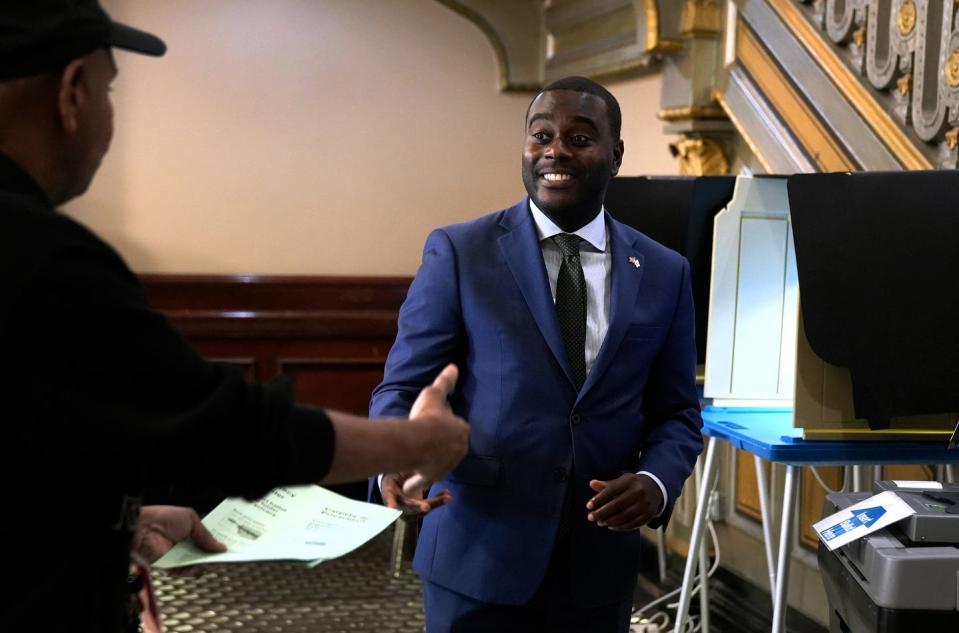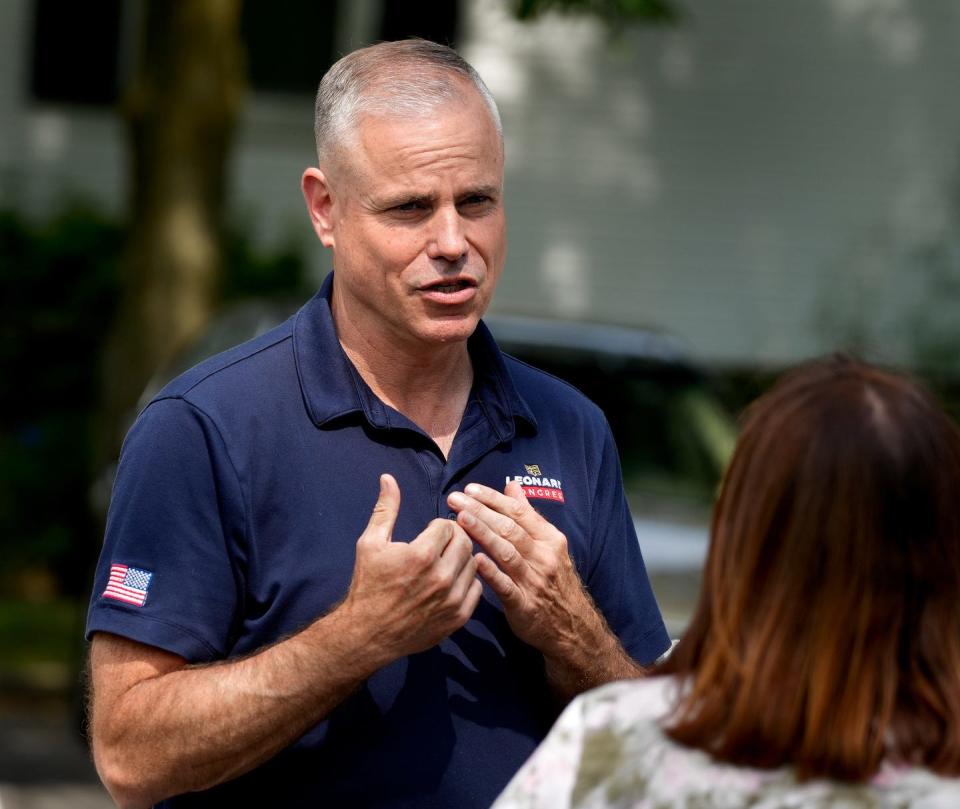As CD1 race enters the home stretch, what's at stake for the candidates and RI voters?
- Oops!Something went wrong.Please try again later.
- Oops!Something went wrong.Please try again later.
- Oops!Something went wrong.Please try again later.
The race to replace David Cicilline in Congress did not end when Gabe Amo won the Democratic primary after Labor Day – even if it looked that way.
The blanket news coverage, relentless campaign canvassing and nonstop television ads that filled August largely fell away with the 11 Democrats who lost to Amo, but there is one more vote before Rhode Island's 1st District once again has a representative in Congress.
Gerry Leonard Jr., the former Marine officer from Jamestown who coasted to the GOP nomination, is crisscrossing the district in hopes that voters hold a latent desire to upend the status quo of Democratic domination and make him the first Republican House member from the Ocean State in nearly 30 years.
How big an upset would that be?
Consider: The National Republican Congressional Committee has issued more than 40 Rhode Island campaign hits since March, all of them attacking 2nd District Rep. Seth Magaziner, who isn't on the ballot this year.
In other words, Republicans in Washington who a year ago were frothing at the prospect of Allan Fung flipping a safe Democratic seat in New England are not bothering to help Leonard, or possibly even learn his name.
Still, Amo isn't resting or taking extra shifts behind the counter of his father's Providence liquor store. He's visiting local businesses and senior centers by day and diving into the federal policy weeds by night in anticipation of the general election campaign's two debates coming next week.
If the odds-makers are right and Amo is the overwhelming favorite, the final week before the Nov. 7 election will be a last chance to vet a candidate who has never held elected office before.
And at the same time, Leonard's campaign provides another field test of how the beleaguered Rhode Island GOP intends to try to break a multi-year losing streak in high-profile elections as the state's electorate drifts left.
High stakes for both parties
If Leonard wins, the shock waves would reverberate to Washington and beyond.
Assuming that doesn't happen, Amo would become the first person of color to represent Rhode Island in Congress, and, at 35 years old, he would be on track for a prominent role in the Ocean State's political power structure for years to come.
Whoever wins on Nov. 7 will serve the remainder of Cicilline's term and then have to run again in 2024 to keep the seat. In recent years, winning reelection has not been a problem for incumbents.
However, the likelihood that the winner of next week's election will have a decade-plus run in Washington like recent predecessors is lowered by the potential for Rhode Island to lose a congressional seat after the 2030 census.
More: Where do the CD1 special election candidates stand on current issues? Here's a guide.
Who is Gabe Amo?
The son of a Ghanaian father and Liberian mother, Amo grew up in Pawtucket but attended the private Moses Brown School on Providence's East Side and then went on to Wheaton College.
At Wheaton, he volunteered on Sheldon Whitehouse's 2006 Senate campaign and Barack Obama's 2008 presidential campaign, which he would later parlay into a job in the White House Office of Public Engagement. He returned to Rhode Island in 2018 to work for then-Gov. Gina Raimondo. Then he bounced back down to Washington in 2020 to work as the White House liaison to the nation's mayors before resigning to run for Congress.
Amo is firmly in the Biden-Raimondo mold of contemporary moderate Democrats: liberal but not leftist; business-friendly but not afraid of government intervention in the economy. It's not clear on which issues, if any, he would break with the rest of Rhode Island's all-Democratic congressional delegation.

A question posed to Amo in the Democratic primary was whether working for high-profile politicians qualified him for Congress having never run for any office before. In debates and on the campaign trail, Amo's positions on issues were the White House's positions on issues. Did he have any opinions of his own?
Asked to name one policy area where he disagrees with former boss Raimondo, Amo says education, the area in which Raimondo acknowledged having unmet goals as she left for Washington.
"Ultimately, I do think we could have done more on education as a whole," Amo said in a recent interview in Providence. "There were lots of great programs associated with Rhode Island Promise [free CCRI,] computer science for Rhode Island, and I think she would say herself if there was one thing she would've done more on if she had more time would be education. I just think there were more opportunities that were prevented by COVID-19 to improve our test scores and get kids on a pipeline to greater economic opportunity."
Even on this issue it is not clear if there is a policy disagreement between Amo and his former boss on education.
As the perceived frontrunner, Amo has largely avoided direct confrontation with Leonard that might elevate the name recognition of his now-lesser-known opponent.
Pressed on why Rhode Islanders enticed by the idea of bipartisanship shouldn't consider Leonard, Amo points to the speaker fight that roiled the GOP for most of October before resulting in the election of Mike Johnson.
"House Republicans can't find a speaker, can't fund a government and have a shutdown on the horizon and can't get themselves organized so that we can support our ally Israel, so that we can support our ally Ukraine, so that we can ward off important threats like the South China Sea," Amo said in an interview the day before Johnson was elected. "They talk a lot about border security and they can't do any of that."
Who is Gerry Leonard?
Like Amo, the 58-year-old Leonard has never run for office before this year and believes he has a compelling personal story to tell.
The son of public school teachers, Leonard left the New York financial services sector to join the Marine Corps, where he rose to the rank of colonel over a 30-year career.
He is running, as many Rhode Island Republicans have, on providing a counterweight to more than a decade of Democratic control of Rhode Island's congressional delegation, and bringing old-fashioned Yankee moderation to Washington polarization.
"John Chafee to me is a role model for what a new Yankee Republican is," Leonard said in a recent interview. "Someone who on his own two feet had the backbone to not necessarily always vote with his party, was not on every single issue fiscally conservative. A little bit more moderate in other areas, but he represented Rhode Island."

Leonard's top issue is deficit reduction, although he is detail-shy on specific spending cuts and would leave that to a blue-ribbon bipartisan budget panel.
He largely avoids the abortion and gun control debates but doesn't support Democrats' push for legislation codifying a right to an abortion or banning assault weapons.
Through almost all of his military career, Leonard did not vote for president because he wanted to maintain neutrality within the chain of command – with one exception. He voted for George W. Bush in the 2000 election that ended with a Supreme Court ruling against Al Gore.
"I just didn't feel Al Gore was genuine and sincere, and that's important to me," Leonard said.
Leonard won't say whom he supports in the 2024 Republican presidential primary.
He calls the Jan. 6 riot at the Capitol a "tragic day for our nation," but he won't say if former president Donald Trump's role in it is disqualifying for a second term.
The ouster of former Speaker Kevin McCarthy, weeks of GOP caucus infighting over a replacement and ultimate elevation of Johnson to preside over the House did not come at a convenient time for Leonard, right before the special election.
Johnson voted against certifying President Joe Biden's election victory. Would Leonard have voted for Johnson for speaker?
"We must end this gridlock," Leonard wrote when asked if he would have voted for Johnson. "The election of a speaker should be a step towards that goal. I do not know Speaker Johnson, but I urge him to stand up to extremes and put principles over politics."
What are the key issues?
The Oct. 7 Hamas attacks in Israel brought American policy in the Middle East to the forefront of the congressional special election, but there is not as much daylight between the Democratic and Republican nominees as there might have been.
As many on the left voiced pro-Palestinian sentiment as violence escalated, Amo was pro-Israel and backs an Israeli military response in Gaza with "no conditions."
That shouldn't be a surprise, as Amo has received significant financial backing from the American Israel Public Affairs Council, the pro-Israeli lobbying group that urges U.S. lawmakers to approve greater military assistance to Israel, among other things.
The general election dynamic would likely have been different if a progressive like Aaron Regunberg had won the Democratic primary and been faced with calls from the GOP to support Israeli military actions that are being criticized on the left.
On domestic policy, Leonard says he would not vote for legislation that would cut benefits or raise eligibility ages for Medicare and Social Security, as some in his party have suggested. Republican efforts to "tear down Social Security" have been an Amo talking point.
On whether Congress should extend the Trump 2017 tax cuts set to expire in 2025, Amo has said he would only extend breaks for Americans making less than $500,000 per year. (Biden has called for extending cuts for people making less than $400,000.)
Leonard has not said if there are pieces of the Trump tax cut package he would not keep, including a cap on the deduction for state and local tax payments, known as SALT.
The SALT deduction primarily helps wealthy property owners, but many Democrats opposed getting rid of it because high-property tax Northeastern states disproportionally benefit.
Amo, in the recent interview, did not take a position on the SALT tax deduction.
Both Leonard and Amo call housing affordability a top issue and share the belief that there are too many restrictions on building more housing, particularly on the local level.
To stem the flow of immigrants crossing the southern border, Leonard thinks the United States should complete construction of the border wall that Trump envisioned.
To the surprise of some, the Biden administration recently finished construction of a new section of border wall, although it is not planning to build as much as Trump wanted.
"The current expansion of border walls and barriers, as announced recently by the Biden Administration, is necessary because Congressional Republicans refused to rescind the money and work towards a more comprehensive solution to immigration in the United States," Amo said in an email.
On foreign policy, Leonard said he believes the Biden administration was wrong to pull all troops out of Afghanistan in 2021, while Amo thinks his former boss was right to end the war.
This article originally appeared on The Providence Journal: 1st District election preview: What's at stake for RI voters?

